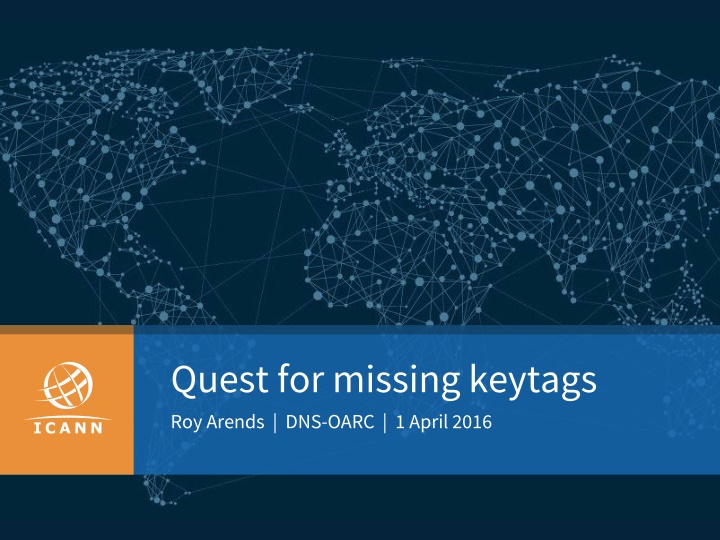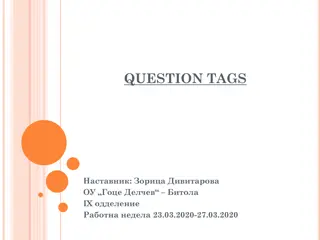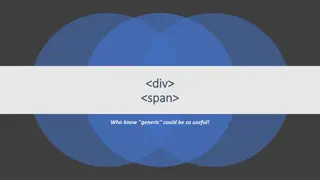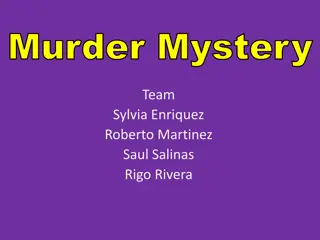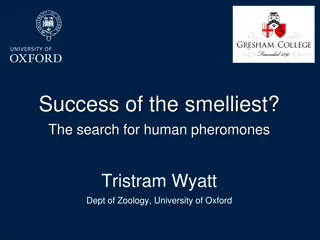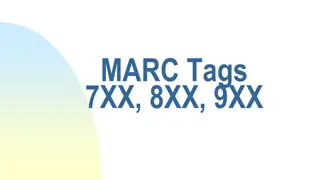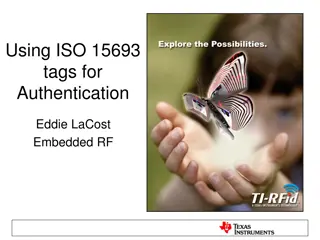Unraveling the Mystery of Missing DNSKEY Key Tags by Roy Arends
This content delves into Roy Arends' quest for missing keytags in the DNS-OARC, starting from 2010 to 2015. It explores the intricacies of DNSKEY Key Tags, the challenges faced in generating keys, and the clever techniques employed to address the issue.
Download Presentation

Please find below an Image/Link to download the presentation.
The content on the website is provided AS IS for your information and personal use only. It may not be sold, licensed, or shared on other websites without obtaining consent from the author.If you encounter any issues during the download, it is possible that the publisher has removed the file from their server.
You are allowed to download the files provided on this website for personal or commercial use, subject to the condition that they are used lawfully. All files are the property of their respective owners.
The content on the website is provided AS IS for your information and personal use only. It may not be sold, licensed, or shared on other websites without obtaining consent from the author.
E N D
Presentation Transcript
Quest for missing keytags Roy Arends | DNS-OARC | 1 April 2016
Pubquiz question: What is a DNSKEY Key Tag a 16 bit value in the DNSKEY RDATA A. a physical tag that you d hang on your key ring B. a 16 bit value in the DS and RRSIG RDATA C. a special variation of the game of tag. D. | 2
Why did I look into this? 2010, first root KSK published, 2015, I started working on my testbed | 3
Why did I look into this? 2010 2015 | 4
Why did I look into this? 2010 2015 I wanted to use those as keytags for my testbed. You can t simply assign a keytag to a dnskey. RFC4034: the algorithm for calculating the Key Tag is almost but not completely identical to the familiar ones-complement checksum used in many other Internet protocols. | 5
Simple loop while true do dnssec-keygen a RSASHA256 f KSK b 2048 . done | 6
Simple loop while true do dnssec-keygen a RSASHA256 f KSK b 2048 . done This only generated about 16K keys I was expecting 64K keys keytags 02010 and 02015 were absent | 7
Simple loop while true do dnssec-keygen a RSASHA256 f KSK b 2048 . done First clue by Duane Wessels: dnssec-keygen won't generate a new key if: the new key tag conflicts with an existing key tag + revoke bit the new key tag + revoke bit conflicts with an existing key tag Nice! Well observed. | 8
Less Simple loop while true do dnssec-keygen a RSASHA256 f KSK b 2048 .\ >> taglist rm K\.+008*; done This simply removes keys after they re created, but adds the tag to a list. | 9
Less Simple loop while true do dnssec-keygen a RSASHA256 f KSK b 2048 .\ >> taglist rm K\.+008*; done This simply removes keys after they re created, but adds the tag to a list. sort u taglist | wc l 16387 | 10
Less Simple loop while true do dnssec-keygen a RSASHA256 f KSK b 2048 .\ >> taglist rm K\.+008*; done This simply removes keys after they re created, but adds the tag to a list. sort u taglist | wc l 16387 Wait, what? Not 16384? | 11
Its the tool, try a different one. while true do ldns-keygen a RSASHA256 k b 2048 . done Nice and simple. No undocumented features. Allows for foot shooting. | 12
Its the tool, try a different one. while true do ldns-keygen a RSASHA256 k b 2048 . done Nice and simple. No undocumented features. ls K.*private | wc l 16385 | 13
Its the tool, try a different one. while true do ldns-keygen a RSASHA256 k b 2048 . done Nice and simple. No undocumented features. ls K.*private | wc l 16385 Still, not high enough. | 14
So, it could be the library DNSSEC-Keygen and ldns-keygen use OpenSSL pdnssec uses mbedTLS Is this a bug in OpenSSL? | 17
So, it could be the library DNSSEC-Keygen and ldns-keygen use OpenSSL pdnssec uses mbedTLS Is this a bug in OpenSSL? KEYSTARVE [goes and registers name] | 18
But. On DNS-Operations Peter van Dijk: I now have ~130k (different!) keys, with 32201 unique key tags. This is almost twice as much as Roy had but it looks like it might top off around 32k. | 19
But. On DNS-Operations Peter van Dijk: I now have ~130k (different!) keys, with 32201 unique key tags. This is almost twice as much as Roy had but it looks like it might top off around 32k. | 20
Now what Three different tools Two different libraries Three issues: Not enough keytags (expected 64K, got less) Off by a few keytags (16387, 16385, 32769) One library produces 50% of the other library 1) 2) 3) | 21
Is it the keytag function? The keytag function is very similar to a radix minus one complement function. Very similar to the Internet Header Checksum. So, generate 2048 random bits in pairs of 2 byte words and do an Internet Header Checksum over that. while true do jot -r 128 0 65535 | awk \ '{s+=$1} END {print (s + int(s/65536))%65535} \ >>test done sort u test | wc l 65536 | 22
It is not the keytag function The keytag function is very similar to a radix minus one complement function. Very similar to the Internet Header Checksum. So, generate 2048 random bits in pairs of 2 byte words and do an Internet Header Checksum over that. It is not the keytag function | 23
It is not the keytag function The keytag function is very similar to a radix minus one complement function. Very similar to the Internet Header Checksum. So, generate 2048 random bits in pairs of 2 byte words and do an Internet Header Checksum over that. It is not the keytag function It is not the library | 24
It is not the keytag function The keytag function is very similar to a radix minus one complement function. Very similar to the Internet Header Checksum. So, generate 2048 random bits in pairs of 2 byte words and do an Internet Header Checksum over that. It is not the keytag function It is not the library It is not the tools | 25
It is not the keytag function The keytag function is very similar to a radix minus one complement function. Very similar to the Internet Header Checksum. So, generate 2048 random bits in pairs of 2 byte words and do an Internet Header Checksum over that. It is not the keytag function It is not the library It is not the tools (and hopefully not the user) | 26
Florian Maury and Jrme Plt The Internet Header Checksum is equivalent to addition modulo 65535 | 28
Florian Maury and Jrme Plt The Internet Header Checksum is equivalent to addition modulo 65535 Assuming a 32 bit number ($num) this means: ($num AND 65535) + ($num >> 16) is equivalent to $num % 65535 | 29
Florian Maury and Jrme Plt $num % 65535 In our case, $num contains the RDATA of the DNSKEY. For all the keys generated, the RDATA part contains a constant: (RDLENGTH,PROTOCOL,ALGORITHM, EXPONENT) And a variable part: The RSA modulus, which consist of two prime factors P and Q | 30
Florian Maury and Jrme Plt Therefore, we have $num % 65535 Is equivalent to: (constant + P*Q) % 65535 Is equivalent to: (constant % 65535) + ((P*Q) % 65535 ) | 31
Florian Maury and Jrme Plt Ignoring the constant part we have: (P*Q) % 65535 We know that P and Q are very large primes. 65535 has factors: 3, 5, 17, 257 Since (P, Q, 3, 5, 17 and 257)are co-prime, P, Q can t be divided by 3, 5, 17 and 257 and (P*Q) % 3, 5, 17 or 257 will never be 0 | 32
Florian Maury and Jrme Plt (P*Q) % 3, 5, 17 or 257 will never be 0 (P*Q) % 3 has 2 solutions (not 3) (P*Q) % 5 has 4 solutions (not 5) (P*Q) % 17 has 16 solutions (not 17) and (P*Q) % 257 has 256 solutions (not 257) So, (P*Q) % 65535 has 2*4*16*256 solutions | 33
Florian Maury and Jrme Plt (P*Q) % 3, 5, 17 or 257 will never be 0 (P*Q) % 3 has 2 solutions (not 3) (P*Q) % 5 has 4 solutions (not 5) (P*Q) % 17 has 16 solutions (not 17) and (P*Q) % 257 has 256 solutions (not 257) So, (P*Q) % 65535 has 2*4*16*256 solutions, or 32768 different keytags | 34
Hoorah! Three issues, one solved: SOLVED: Not enough keytags (expected 64K, got less) Off by a few keytags (16387, 16385, 32769) One library produces 50% of the other library 1) 2) 3) | 35
Off by a few Very similar is not exactly the same The last part of the key-tag function in RFC4034 reads as follows: ac += (ac >> 16) & 0xFFFF; return ac & 0xFFFF; If the previous line result in a carry (value > 65535), the latter line ignores it. Hence, some off by a few keytags are a result of that. | 36
Hoorah! Three issues, two solved: SOLVED: Not enough keytags (expected 64K, got less) SOLVED: Off by a few keytags (16387, 16385, 32769) One library produces 50% of the other library 1) 2) 3) | 37
Half the keyspace Peter, using mbedTLS was able to produce twice as many keytags. OpenSSL only generates safe primes: P = 2 * P` + 1 where P` is also prime. That implies that P mod 3 is never 1 (and thus always 2) So: P*Q=M (P mod 3) * (Q mod 3) = M mod 3 2 * 2 = 4 mod 3 M mod 3 is 1. Always | 38
Half the keyspace (P*Q) % 3, 5, 17 or 257 will never be 0 (P*Q) % 3 has 2 solutions (not 3) (P*Q) % 5 has 4 solutions (not 5) (P*Q) % 17 has 16 solutions (not 17) and (P*Q) % 257 has 256 solutions (not 257) So, (P*Q) % 65535 has 2*4*16*256 solutions, or 32768 different keytags | 39
Half the keyspace (P*Q) % 3, 5, 17 or 257 will never be 0 (P*Q) % 3 will always be 1 (P*Q) % 3 has 1 solution (not 3) (P*Q) % 5 has 4 solutions (not 5) (P*Q) % 17 has 16 solutions (not 17) and (P*Q) % 257 has 256 solutions (not 257) So, (P*Q) % 65535 has 1*4*16*256 solutions, or 32768 different keytags 16384 | 40
Hoorah! Three issues, two solved: SOLVED: Not enough keytags (expected 64K, got less) SOLVED: Off by a few keytags (16387, 16385, 32769) SOLVED: One library produces 50% of the other library 1) 2) 3) | 41
Thanks to Warren Kumari Ben Laurie Florian Maury J r me Pl t Jean-Ren Reinhard Peter van Dijk Bert Hubert David Conrad And all who have participated in the discussions on dns-operations | 42
Questions? | 43
